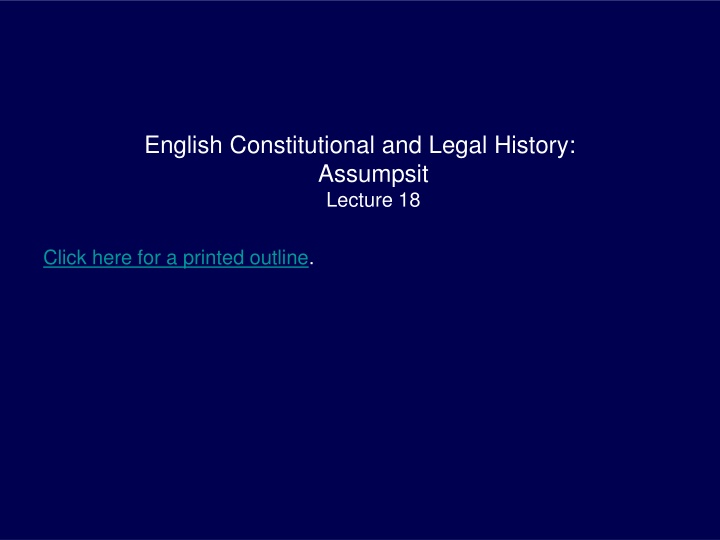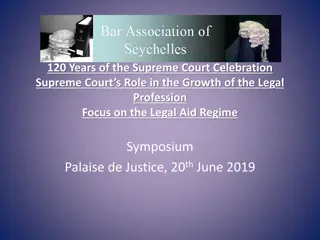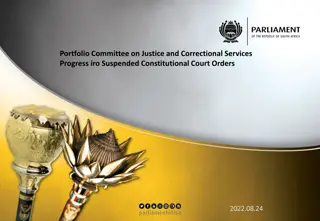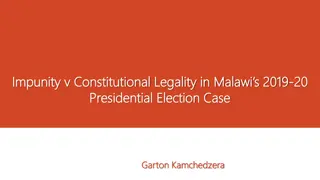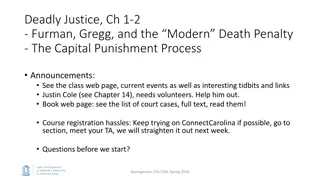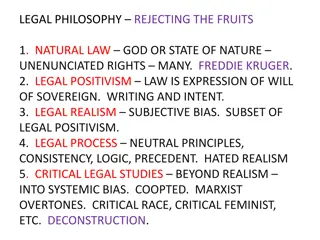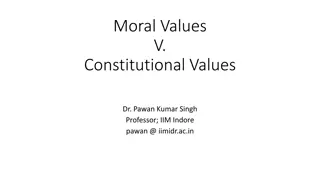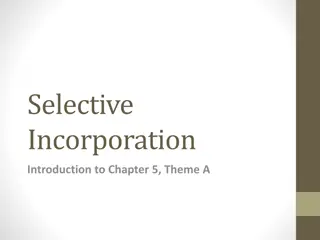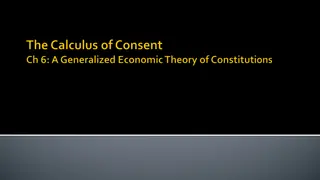Evolution of Legal Actions in English Constitutional History
The lecture delves into the evolution of legal actions in English constitutional and legal history, exploring the transition from traditional actions like debt and covenant to the emergence of the action on the case. It discusses the conceptual nuances distinguishing between torts, trespass, and contractual obligations, shedding light on the development of substantive law and the gradual establishment of specific duties beyond general obligations. The narrative traces the origin of these duties to customs, with the narrative mulling over the uncertainties and explorations characterizing legal developments in the late 14th century.
Download Presentation

Please find below an Image/Link to download the presentation.
The content on the website is provided AS IS for your information and personal use only. It may not be sold, licensed, or shared on other websites without obtaining consent from the author.If you encounter any issues during the download, it is possible that the publisher has removed the file from their server.
You are allowed to download the files provided on this website for personal or commercial use, subject to the condition that they are used lawfully. All files are the property of their respective owners.
The content on the website is provided AS IS for your information and personal use only. It may not be sold, licensed, or shared on other websites without obtaining consent from the author.
E N D
Presentation Transcript
English Constitutional and Legal History: Assumpsit Lecture 18 Click here for a printed outline.
Introduction We ended the last lecture with Berden v. Burton in which is was clear that there were two possible actions for what we would call a tort, trespass and trespass on the case. Counsel and the court engage in interesting discussion of what the line or lines between the two actions might be. Many possible, perhaps all possible, standards of liability are mentioned: absolute liability, negligence, direct vs. indirect injury, intentional vs. accidental injury. Someplace in there lies the line between trespass and case and between case and no liability. No conclusion is reached in the case because it was settled, but the chief justice and the most senior serjeant clearly saw in the 14th century what the possibilities were. This lecture picks up a thread in these early cases and pursue it. The thread is one that is going to take us into what today we would call a contract action. We will see that that is not what they would have called it, but they do seem to have an idea some types of actions on the case were different from other kinds, and the type of action that was different was the ones where normally the writ used the word assumpit( s/he undertook ). Our exploration, therefore, is both diachronic and synchronic.
Old personal actions: debt, detinue, covenant, and account Debt action for a specific sum of money owed by defendant to plaintiff, the loan transaction is typical, also the sale transaction where the seller has delivered the goods but the buyer hasn t paid, the imbalance in accounts, wager of law this is contract in medieval parlance Covenant action for enforcement of promises, the successful plaintiff gets the performance or its value, jury, early in the 14th century the central royal courts for procedural reasons that are still quite obscure decided that one must have a sealed instrument
The rise of the action on the case In Lecture 17 our emphasis was on jurisdictional and procedural developments, not on conceptual ones, because our notion was that the concepts were already there. The question was which court would handle it and how. There is no question that people in the 13th century well knew that one could commit a wrong by ways other than punching someone in the nose and that one could breach a contract even if the promise wasn t under seal. But there was no law on these topics in the central royal courts, because those courts were nominally limited to injuries against the king s peace normally with force and arms and to covenants under seal and partially executed contracts and because complicated issues of responsibility such as that raised by Brainton v. Pinn, were left to the jury. The rise of the action on the case does create substantive law, in the sense that it becomes possible by the use of the whereas (cum) clause to allege the violation of a more specific duty than the general one not to commit breaches of the peace or to perform what one had agreed to perform under seal. The question then became where would these duties come from, and the earliest cases suggest that the first source of such duties are custom: the miller, the innkeeper, the smith, the horse-doctor. But how much further would this go? No one knew in the late 14th century and a process of groping began. I want to tell two stories, one about how the action on the
The rise of the action on the case (contd) But how much further would this go? No one knew in the late 14th century and a process of groping began. I want to tell two stories, one about how the action on the case came to take over for covenant and the other about how it came to take over for debt. The first is eminently a problem of how far will we go; the second much less so. The first is largely a story of the 14th and 15th centuries, the second largely a story of the 16th.
Not doing is no trespassbut see the Innkeepers Case (CR 1368) (Mats., p. VII 21) Trespass was brought by one W. against one T., an innkeeper, and his servants; and he counted that, whereas throughout the whole kingdom of England it was the custom and use, where a common inn was kept, that the innkeeper and his servants should keep (garde) the goods and chattels which their guests had in their rooms within the inn while they were lodged there, the said W. came there on such a day, etc., into the town of Canterbury to the said T. and there lodged with him together with his horse and other goods and chattels, to wit, clothes, etc. and twenty marks of silver in a purse, and he took a room there and put these goods and chattels and the silver in the room, and then went into the town for other things; and while he was in the town, the said goods and chattels and silver were taken out of his room by evildoers through the default of the innkeeper and his servants in keeping them, wrongfully and against the peace (per tort et encounter le peace), to his damage, etc. And he had a writ on all the matter according to the case (sur tout le mattere accorde al cas).
The Innkeepers Case (contd) And the innkeeper demanded judgment, because he had not alleged in his count, nor in his writ, that he had delivered to him the goods and silver, nor that the goods were taken by them, so that he had supposed no manner of blame in them; and also he had delivered to him a key of his room to keep the goods therein; and he asked judgment if this action lay; and on this matter they demurred. And it was adjudged by KNIVET, CJ, that the plaintiff should recover against them. And the court taxed the damages, and he will not get the damages just as he counted them. Here the allegation of the custom of the realm that innkeepers were absolutely liable for the loss of their guests goods survives a demur, but that is unusual. The concept of not doing is no trespass is a problem in tort as well as in contract, but I can t tell you the tort story today. We ll try to say something about it at the end of the course.
Early trespass cases with contractual elements: The Humber Ferry Case (1348, Mats. p. VII 19). This, of course, antedates the development of the action on the case and may have been responsible for having precipitated them. John de Bukton complains by bill that Nicholas atte Tounesende on a certain day and year at B. upon Humber had undertaken to carry his mare in his boat across the river Humber safe and sound., and yet the said Nicholas overloaded his boat with other horses, as a result of which overloading his mare perished, wrongfully and to his damage. The defendant s counsel argues: We pray judgment of the bill, which suppose no wrong in us, but rather proves that he should have an action by way of covenant rather than by way of trespass. But the court says: It seems that you did him a trespass when you overloaded your boat so that his mare perished. So answer.
Early trespass cases with contractual elements (contd) Waldon v. Marshall (CB, 1370, Mats., p. VII 23) : William Waldon brought a writ against one J. Marshall, and alleged by his writ that the aforesaid John took in his hand the horse of the aforesaid William to cure it of its infirmity, and afterwards the aforesaid John so negligently did his cure that the horse died. . . . Kirton. Because he has counted that he had undertaken to cure his horse of his malady, for which he should have had an action of covenant, judgment of the writ. Belknap. That we cannot have without a deed; and this action is brought because you did your cure so negligently that the horse died, wherefore it is right to maintain this special writ according to the case; for we can have no other writ. Kirton. You could have a writ of trespass, that he killed your horse generally. Belknap. A general writ we could not have had, because the horse was not killed by force, but died by default of his cure. . . . And then the writ was adjudged good. . . .
Early trespass cases with contractual elements (contd) Surgeon s Case (CR, 1375, Mats., p. VII 24): A man brought a writ of trespass on his case against one J. M., surgeon, and the writ ran thus, that, whereas the plaintiff s right hand was wounded by one T. B., the defendant undertook to cure him of his malady in his hand, but that by the negligence of the said J. and his cure, the hand was so injured that he was maimed wrongfully and to his damage. And note that in this writ there was no mention in what place he undertook, etc., but in his count he declared that he undertook in London in Tower Street in the parish of B. And the writ was not vi et armis nor contra pacem, etc. Gascoigne. He did not undertake to cure him of the malady, as he has alleged: ready to wage our law. Honnington. This is an action of trespass and of a matter which lies within the cognisance of the country, in which case wager of law is not to be granted: wherefore, for default of answer, we demand judgment and pray our damages. CAVENDISH, C.J. This writ does not allege force and arms nor against the peace, so that wager of law is to be allowed. . . . And this is the opinion of the whole court. . . .
Surgeons Case(contd) [The case was then adjourned.] Afterwards he waived the tender of law and said that he did not undertake to cure his hand: ready, etc. Issue was joined on this. Gascoigne. Now, Sir, you see well that the writ does not mention in what place he undertook to cure him, so that the writ is defective in this matter, for the court cannot know from what neighbourhood the jury shall come. Persay. He has not defined the place in his writ; wherefore we demand judgment of the writ. Honnington. Because we have assigned in our count the place where he undertook our cure, therefore, though it is not mentioned in the writ, it is yet sufficient to bring together the jury from the place where we have affirmed the undertaking to have been made. Wherefore judgment if our writ be not good.
Surgeons Case(contd) CAVENDISH, C.J. At this stage it is seasonable to challenge the writ for that he has not assigned the place of the undertaking, because it is necessary to summon the jury from that place; but if he had waged his law according to our first issue, then it would not have been necessary to have assigned a place in the writ. Moreover, this action of covenant of necessity is maintained without specialty, since for every little thing a man cannot always have a clerk to make a specialty for him. . . . And then, because the place was not named in the writ where the cure was said to have been undertaken, the action abated. And the plaintiff was in mercy. An attempt at wager of law, is an appropriate response in a writ of debt and perhaps in other contractual actions as well. Then, curiously, though the court seems willing to accept his wager, the defendant drops his wager, but ultimately wins because the writ does not allege where the undertaking took place. It is possible that defendant s counsel laid a trap for the plaintiff.
The rise of assumpsit Something happened between the Humber Ferry Case and the Surgeon s Case. We said in the last lecture that writs on case go back at least as far 1352. They almost, but not quite all, deal with traditional occupations, common callings as the cases sometimes call them: the carrier, the shepherd, the carpenter, the horse-doctor, the fuller. In all of these cases the writ alleges that the plaintiff turned over something to the defendant, ad bene custodiendum, to keep well , and that s not what happened: the goods were lost, the sheep strayed and got into trouble, the lumber was cut to the wrong length, the horse got sicker or died, the cloth was damaged. The problem was that all of these folks were supposed to do more than just keep the goods; they were supposed to take the goods from point X to point Y, to graze the sheep, to build something with the lumber, to cure the horse, to dye or clean the cloth. Just to keep well didn t really cover all the things that could go wrong in this situation. There were also some situations in which nothing was handed over. The building contractor, as opposed to the ordinary carpenter, supplied the materials. The surgeon was not given someone s body part to keep well; he was supposed to fix what was wrong with it. (cont d on next slide).
The rise of assumpsit(contd) Starting in the mid-1360s, the form of the writ was changed. In almost, but not quite all of these cases, rather than saying that something was handed over to the defendant, the writ said that he undertook (assumpsit) to do what he was supposed to do and did not do it. Sometimes it certainly looks as if the defendant may not have done anything at all. The word negligenter is frequently used, and we should recall that that word does not necessarily mean that someone did a job badly. If I say I neglected to do that , I don t mean that I botched the job, I mean that I didn t do it.
Not doing is no trespass? There are many cases on the plea rolls: that allege that the defendant undertook to do something and did not do it; where plaintiff has no specialty; where plaintiff wants damages not performance; and defendant is not in a common calling or under the Statute of Labourers. John Baker, who did the work, didn t find any that reached the pleading stage. He speculates that most of them were settled and suggests that their presence may have made it easier to breach the wall of the conceptual barrier. That much is clearly right, but conservative. It may well be that what we are seeing in the YBB is unusual. The last gasp, as it were, of an old guard.
Not doing is no trespass? (contd) In the YBB the movement away from the concept of not doing is no trespass comes in cases where there are: special damages; deceit; disablement; advance payment. John Baker, who did the work, didn t find any that reached the pleading stage. He speculates that most of them were settled and suggests that their presence may have made it easier to breach the wall of the conceptual barrier. That much is clearly right, but conservative. It may well be that what we are seeing in the YBB is unusual. The last gasp, as it were, of an old guard.
Not doing is no trespass? carpenters and the S/Labourers Watton v. Brinth (CB, 1400, Mats. p. VII 27) and Anon. (CB, 1409, Mats., p VII 27) show us the conceptual difficulty: not doing is no trespass, or covenant is the writ that ought to bring if you are complaining that someone promised to do something that he didn t do. (Both cases involve carpenters and both suggest that an action under the Statute of Labourers might lie.) In the 14th century a private action founded on the Statute was invented, and there was a tendency to expand the scope of the action under the Statute, both to workers that were not explicitly covered by the statute and to those who held themselves out to do a certain kind of work (a common carpenter, or a common surgeon) even if they had not explicitly promised to this particular plaintiff. In cases later in the 14th century, there was a tendency to shift the focus from the element of the common calling to the agreement to do the work. The tendency, however, in the 15th century was to limit the action on the Statute to the types of workers mentioned in the Statute and to exclude from the action on the statute cases where there had been a specific contract to do a piece of work.
Not doing is no trespass? the fundamental problem? In Watkins (CB, 1425, Mats., p VII 28) a long discussion suggests, perhaps, that the problem basically one of causation. How can the defendant be said to have caused the harm when he didn t do anything? At least two of the justices seem to be willing to allow the writ, but the Chief Justice cuts off the discussion unless the defendant demurs.
Special damages Anon. (CB 1436) (Mats, p. VII31): Trespass was brought by one R. sur son cas. And he counted that the plaintiff had bargained for certain land for a certain sum from the defendant, and he showed everything in detail, and that the covenant of the defendant was that he should cause third parties to make release to him within a certain time and that they had not so released; and so the action accrued to him. Ellerkar. This action sounds in the nature of a covenant, wherefore he should have had a writ of Covenant, and not this writ. Newton. In as much as you acknowledge the trespass and show no other matter, we demand judgment. Ellerkar. I think your writ should abate, for several similar cases have been adjudged in the law before now. Thus, in the case that I make a covenant with a carpenter to make me a house within a certain time and he does not do so, Il shall have no action save by a writ of Covenant. And the law is the same if one takes upon himself to shoe my horse and he does not do so, no other action shall I have save a writ of Covenant; and so, if he does not do it and there is no specialty, the action fails. (cont d on next slide)
Special damages Anon.(CB 1436) (contd): So here, he has taken upon himself to make a stranger release, which is a covenant, and he shows that he has not released, which is nothing but a covenant broken; wherefore I think the writ should abate. Newton. I think the contrary, and that the writ is good. In the case of the carpenter which Ellerkar has put, I agree well that it is law that, if a carpenter makes a covenant with me to make a house good and strong and of a certain form and he makes me a house which is weak and bad and of another form, I shall have an action of Trespass sur mon cas. So, too, if a farrier makes a covenant with me to shoe my horse well and properly and he shoes and lames him, I shall have a good action. So, too, if a leech takes upon himself to cure me of my maladies and he gives me medicines but does not cure me, I shall have Action sur mon cas. Again, if a man makes a covenant with me to plough my land in good season and he does so in unseasonable time, I shall have Action sur mon cas. And the cause in all these cases is that there is an undertaking and a matter in fact beyond that which sounds in covenant. So, in the case at bar, he has taken upon himself that a stranger shall release to the plaintiff, which is an undertaking, and, inasmuch as this has not been done, the plaintiff has tort, as in the cases before rehearsed.
Special damages Anon.(CB 1436) (contd): PASTON, J. I think the same. As to what has been said, that, if the carpenter takes upon himself to make me a house and does not make it, I shall not have Accion sur mon cas, I say, Sir, that I shall. And, Sir if a farrier makes a covenant with me to shoe my horse and he does not do it, and I go on my way and my horse has no shoes and is ruined for lack of shoes, I shall have Accion sur mon cas. And if you, who are Serjeant at Law, take upon yourself to plead my cause and do not do it, or do it in some other manner than I wish, whereby I suffer loss, I shall have Accion sur mon cas. So it seems to me that in the case at bar the writ is good. JUYN, J. I agree. And, as PASTON has said, if the farrier does not shoe my horse, I shall have an action against him as much as if he had shod him and lamed him. For all this is dependent upon the covenant and accessory to it, and, as I have an action for the accessory, so I shall have an action for the principal. PASTON, J. That is very well said.
Deceit, e.g., Somerton (CB, 1433, Mats., p. VII30) The King to the sheriff. greeting, etc. Distrain John Colles of Northaston . . . to show why, whereas the said William Somerton retained at Northaston the aforesaid John Colles to be of his counsel for the purchase of the manor of Northaston from John Boteler to the aforesaid William and his heirs, or at least to procure a term of years therein, for a certain sum paid to the said John Colles by the aforesaid William as agreed between them under a certain form of agreement, and whereas the aforesaid John Colles agreed and undertook (assumpsit) for the said certain sum as promised between them, to obtain the aforesaid manor to the said William and his heirs, or at least a term of years to be held from the aforesaid John Boteler, yet the aforesaid John Colles, by collusion between himself and John Blunt at Northaston, contriving basely to defraud the said William in this behalf, maliciously revealed all the counsel of the said William in this behalf to the aforesaid John Blunt, and there and then falsely and fraudulently became of the counsel of the same John Blunt and, contrary to his aforesaid promise and assumption, procured the said manor to the said John Blunt for a term of years to be held of the aforesaid John Boteler, to the damage of the said William, etc.
Deceit, e.g., Somerton(CB, 1433) (contd) BABINGTON, C.J. [I]f I retain one to purchase a manor for me, and he does not do so, I shall not have any action against him without a deed; but, if there had been a deed, I could have had an action of Covenant because he had not done what he was retained to do. But if he becomes of counsel with another in this matter, then, because I have been deceived, I shall have accion sur mon cas, for he is bound to keep my counsel when he is retained by me. But if a man shows his title-deeds to a man of Law, who afterwards becomes of counsel with another and then discloses the said title-deeds to him, he shall not have an action against him on this matter, because he did not previously retain him. As for the suggestion that he warranted to him to purchase the manor, for this matter he will have no action other than an action of Covenant; and for this he must have a deed to the effect that he was retained to buy the manor, etc., and that he warranted to him to do this. But this is only a covenant, and, if he has no deed, he cannot have an accion of Trespass sur son cas: for there is no more than a covenant broken. But if he betrays his counsel and becomes of counsel for another to purchase this manor for him, now here is a deceit for which I shall have accion sur mon cas. . . .
Deceit, e.g., Somerton(CB, 1433) (contd) COTTESMORE, J. To the same intent. And I say that matter which lies wholly in covenant can by malfeasance ex post facto be converted into deceit. For if I warrant to purchase for you a manor, notwithstanding that I fail to do this for you, no action will lie for these bare words without a deed to this effect. And in the same manner, if I warrant to pay you 20 without deed, you shall not have an action, since the warranty sounds in covenant. So here, the retainer of the one part and the warranty of the other sound wholly in covenant; yet, when he has become counsel for another, that is a deceit and changes all that came before, which was but covenant between the parties, and for this deceit he shall have Accion sur son cas. ... A man retained as counsel in a real estate deal was alleged to have become counsel to the another party in the same deal. The notion that direct deceit was a wrong that grounded a writ of trespass is considerably older than this case. Here the deceit is a bit less direct, and perhaps this is why it took three sittings to resolve the case.
Disablement, e.g., Doiges Case (Ex. Ch., 1442, p. VII32) NEWTON, CJCB. The defendant has disabled herself from keeping her covenant with the plaintiff because she has enfeoffed another and, moreover, the day has passed by which the feoffment should have been made. To what effect, then, would he have a writ of covenant, when the defendant cannot be held to any covenant with him, even if there was a specialty? (Implying that it would be pointless.) Now, when the plaintiff has made a firm bargain with the defendant, the defendant can demand the purchase price by a writ of debt, and in conscience and in right the plaintiff ought to have the land, even though the property cannot pass to him in law without livery of seisin. For it would be amazing law (merveillous Ley), then, if there should be a perfect5 bargain under which one party would be bound by an action of debt and yet be without remedy against the other. Wherefore the action of deceit well lies.
Disablement, e.g., Doiges Case(Ex. Ch., 1442) (contd) FORTESCUE, CJCR. If by a deed of indenture I lease land to a man for a term of years by deed indented and then I oust him within the term, and twenty years (say) after the end of the term he brings an action of covenant against me, the action lies well; and yet he cannot recover the term itself, but damages only. So in this case. And as to the argument that, because he has disabled himself from executing the covenant, the action of deceit lies, I will put you a case where the party has disabled himself and yet no action lies save covenant. For suppose I make a lease for a term of years to Paston [one of the justices], and then I lease the same land to Godrede, [another justice] who goes into occupation: now I have disabled myself from giving Paston his lease, and yet he shall have only a writ of covenant against me.
Disablement, e.g., Doiges Case(Ex. Ch., 1442) (contd) PASTON, JCB. Because a man can have a writ of covenant, it does not follow that he shall not have a writ of deceit; for perchance all the covenants are kept and yet he is deceived. For suppose a carpenter takes upon himself to make me a house of a certain length and width and height, which he does, but makes default in the joinery or some such thing, which is outside the covenant; now the action of covenant will be of no use to me because he has kept all the covenants, and yet I shall have an action of trespass on my case for his misfeasance. So here, though I can have a writ of covenant, yet, since she has disabled herself as aforesaid, I shall have deceit. This complicated case that eventually went to the Exchequer Chamber, an informal gathering of all the justices and the Chancellor to resolve particularly difficult cases. Mrs. Doige (whose real name seems to have been Dodge) agreed to sell land to William Shipton. She didn t. She sold it to John Melbourne. The question is whether William can bring an action on the case against her when, after all, she just didn t do something. The answer seems to be that she did do something; she sold the land to John thus disabling herself from selling it to William. The action lay and William recovered.
Fyneux, CJKB (dictum, 1499, Mats., p. VII35) In Gray s Inn. Note, if a man makes a covenant to build me a house by a certain date, and does nothing about it, I shall have an action on my case for this nonfeasance as well as if he had built badly, because I am damaged by it: per FYNEUX. And he said that it had been so adjudged, and he held it to be law. It is likewise if a man bargains with me that I shall have his land unto me and my heirs for 20, and that he will make an estate to me if I pay him the 20, and he does not make an estate to me according to the covenant, I shall have an action on my case and need not sue out a subpoena. The last remark is telling. Subpoena is the process used by the court in the Chancery, and Fyneux is clearly concerned about competition. That s the end of the objection CP under Frowyk, CJ, goes along; see Mats.,p. VII 45: If I covenant, in return for money, to make a house by a certain day, and do not do it, an action on the case lies for the misfeasance, but prepayment, as posited in the dictum, raises the issue of what will support the covenant if there is no prepayment, and will result in a huge snarl that has become known as the doctrine of consideration..
The movement away from not doing is no trespass in the case of debt and detinue In the early 16th c. Common Pleas, as it was now called, took a strict view of the availability of assumpsit in lieu of debt. It took the position that if debt (or detinue) was available, that s what must be brought. On the other hand, King s Bench, as it was now called, allowed assumpsit to substitute for debt or detinue so long as the plaintiff was willing to allege a promise subsequent to the initial transaction. The problems were what was the consideration for the subsequent promise and the relationship of that consideration to the quid pro quo for the debt. In 1585, Parliament, for the first time, provided for writ of error jurisdiction from the Queen s Bench. A writ of error had long lain from Common Pleas to Queen s Bench, but error from Queen s Bench only lay to Parliament, and Parliament had lots of other things to do. The intermediate appellate court established in 1585 provided for a court in the Exchequer Chamber consisting of the justices of Common Pleas and the barons of the Exchequer, but not the justices of QB.
The movement away in the case of debt and detinue (contd) The result in cases of assumpsit for debt became a scandal. Plaintiffs would bring assumpsitfor debt in Queen s Bench, but the case might be heard at nisi prius by a Common Pleas justice, who would quash the action. But the action would then be reinstated by the full Queen s Bench. The defendant would then bring a writ of error in the new Exchequer Chamber, which would then reverse. If the plaintiff brought the action initially in Common Pleas, Common Pleas would quash the writ. The plaintiff could then bring error in Queen s Bench which would reinstate the writ. The statutory Exchequer Chamber did not have jurisdiction over error cases QB. Error in Parliament remained a possibility, but since error in Parliament was more a possibility than a practical reality, the plaintiff was better off bringing the case initially in the court that would initially reject it.
Slades Case (Ex. Ch., 1602, Mats., p. VII50) In 1597, a jury rendered a special verdict at nisi prius that the defendant in an ordinary sales case had bought the goods for a particular price but had made no separate promise to pay the price. The verdict was returned into QB, but rather than affirming it, Popham, CJQB, referred it not to the new statutory Exchequer Chamber but to the old informal Exchequer Chamber in which all the justices of England and the Chancellor sat. The case was argued off and on over the course of five years. In 1602, on the basis of a straw vote without opinions, QB entered judgment for the plaintiff. Shortly thereafter, Coke, who argued the case for the plaintiff, Slade, reported a series of resolutions that he thought had been made in the case. After considerable grumbling, Common Pleas accepted the result, and Coke s resolutions became law. Every contract executory imports in itself an assumpsit. Contract executory here does not mean what we mean by an executory contract. It means a partially executed contract, one performed on one side, so that the debt or the goods are owing. You can bring assumpsit even if debt is available.
Slades Case (Ex. Ch., 1602) (contd) In assumpsit for debt, the defendant may not wage his law. The problem of consideration was finessed. In 1611 all the justices decided that this assumpsit would be available against executors. Hence, as of 1611, there was a unitary contract action. Whether this means that there was a unitary idea of contract is a question to which we will return to it at the end of the course.
